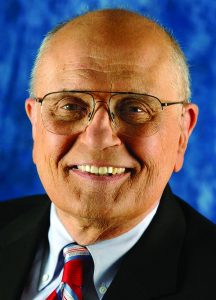
Rep. John D. Dingell Jr.
John D. Dingell Jr., a very pro-gun Michigan Democrat and hunter who was the longest-serving member of Congress in US history and served for many years on the Board of Directors of the National Rifle Association, used his considerable power in the House of Representatives to uncover government fraud and defend the interests of his home state’s automobile industry, died Feb. 7 at his home in Dearborn. He was 92.
In 1974 at the NRA’s annual meeting in San Diego, CA, Dingell introduced the motion to create the Institute for Legislative Action, the Association’s political lobbying arm. Three years later he was a supporter of Cincinnati reform movement that paved the way for the modern NRA political influence.
According to The Washington Post obituary, the office of Michigan Gov. Gretchen Whitmer (D) announced his death, saying Dingell had complications from prostate cancer.
The congressman was a long-time reader of this publication and its predecessor The New Gun Week and kept current on gun legislation and firearms industry issues. While on the NRA Board Dingell and fellow congressman NRA-board member, the late John Ashbrook (R-OH), were frequent and powerful voices during annual members’ meetings deliberations.
Dingell announced in February 2014 that he would not seek a 30th full term in Congress, and he was succeeded by his wife, Debbie Dingell. That November, President Barack Obama awarded him the Presidential Medal of Freedom, the country’s highest civilian honor.
Dingell had served as the representative from Michigan’s 15th Congressional District since 1955, when he won a special election to replace his father, John D. Dingell Sr., a New Deal Democrat who died of tuberculosis while in office. Dingell’s father was the co-sponsor of the 1950s Sport Fishing Restoration Act that authorizes the Secretary of the Interior to provide financial assistance for state fish restoration and management plans and projects. The younger Dingell voted several times on amendments to the act until the last change in 1992.
For many years, Dingell received an A+ rating from the NRA. He helped make firearms exempt from the 1972 Consumer Product Safety Act so that the Consumer Product Safety Commission had no authority to recall defective guns.
Known as “Big John” and “The Truck” for his forceful nature and his hulking 6-foot-3-inch frame, the younger Dingell rose to become chairman in 1981 of the Energy and Commerce Committee, which handled nearly half of the bills in the House and covered a sprawling policy realm including transportation, consumer affairs and public health, The Post reported.
When asked to define the jurisdiction of his committee, Dingell liked to point at a photograph of the Earth taken from space.
The Post obituary featured a photo of House Speaker Nancy Pelosi (D-CA) and Rep. Dingell in 2009, announcing a health-care restructuring plan that evolved into the Affordable Care Act. They were shown holding the gavel used by Rep. Dingell as speaker pro tempore when Medicare passed in 1965.
While a pragmatic liberal Democrat, Dingell was a powerful friend of the pro-gun community throughout his long Congressional career, voting consistently in support of the Second Amendment and sportsmen’s hunting and conservation issues.
But The Post obituary focused more on his support, not of the gun community, but the auto industry.
The Post said Dingell was one of the American auto industry’s most stalwart, influential friends on Capitol Hill, and invariably resisted efforts to regulate car manufacturers. In addition to repeatedly blocking more stringent fuel-efficiency and emissions standards, he staved off efforts to require safety features such as seat belts and air bags.
Dingell’s unwavering allegiance to the auto industry drew criticism, especially after his 1981 marriage to Deborah Insley, a senior executive at General Motors and a member of that company’s founding family. One environmental lobbyist, a longtime foe of Dingell’s, said the congressman was “literally married to General Motors,” a charge Dingell denied.
“I was fighting for autoworkers long before I met Deborah,” he told The Washington Post in 2010. “The fact is that I am not married to the auto industry, but I am elected to represent the people of Michigan and in our part of the country, my people live and die by the success of the auto industry and manufacturing.”
In 1979, he sponsored a bill to prohibit federal spending on passive restraints such as air bags and accused the Transportation Department of concealing evidence that air bags were at risk of exploding and burning passengers. Five years later, he continued to attack the air bag as a “defective instrument” that “does not work except in head-on collisions and only in a fraction of those.”
“Because of his influence among the Democrats in the House, it was impossible to get a consistent Democratic Party stand over the decades for stronger regulation of the industry,” consumer-safety advocate Ralph Nader said. “So the existing standards became obsolete, and that was fine with him.”
The list of legislative accomplishments for Dingell is extraordinarily long and can be found on many websites. He played a key role in passage of the Endangered Species Act, the 1990 Clean Air Act amendments, the Safe Drinking Water Act, and legislation to create the first international wildlife refuge in North America.



